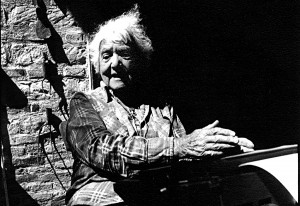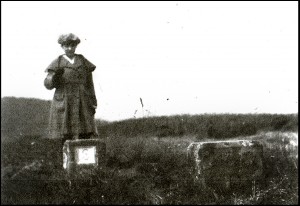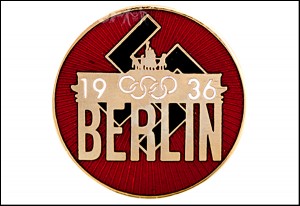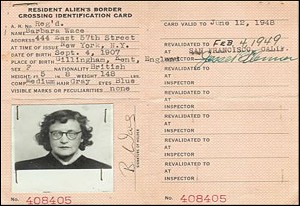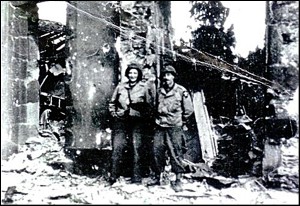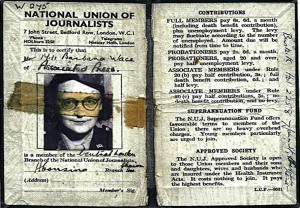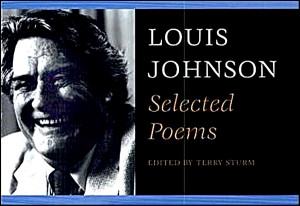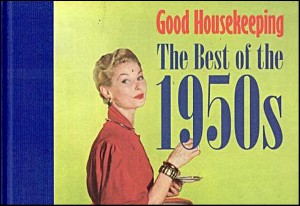America, 1940 – by Barbara Wace
Written by Barbara in April 1995:
In the darkest days of 1940, when France had fallen and public figures like Jo Kennedy were predicting the defeat of Britain, the handful of British in Washington and New York had a hard time keeping up morale.
While Lord Lothian was ambassador I think we all felt a strong link with home. His manner was quiet and friendly, and I remember he would wander around chancery passages and chat with anybody who was working late. One night, about eleven p.m., I was kneeling on the floor outside my office stapling together the roneod pages of a speech he was to make the next day, and which, for the first time the newly created British Press Office, to which I was attached, hoped to send by air to the west coast so it could be published simultaneously. “What on earth are you doing at this time of night?” he asked as he stopped beside me. “Stapling your speech” I told him without looking up from the job. In a flash he was down on his knees beside me, and the job was done in less than an hour.
I remember the mixture too, of ill assorted British in the cipher room in the long evenings when the bad news came through. There would be perhaps, Miss Boyle, the very elegant upper class private secretary to the ambassador, the third secretary Tony Rumbold, his wife Felicity and the Naval Attaché and his wife, who were probably working late downstairs in the cramped chancery offices. We shorthand typists found it a relief to climb those twisting steps to the cipher room and feel you were doing something to help as the bad news filled the American newspapers.
There was a small core of friends of Britain among those living in Washington, but much of the feeling in America was isolationist and uninterest. I remember one afternoon when the news was particularly gloomy, Max Boyd, a staffer of the A.P. who I had known in London, took me to the Presidents afternoon press conference held, I think, at the White House. Those attending included the regular press corps and a handful of visitors including, I remember, young Randolph Churchill who was in those days not a very endearing character. Roosevelt sat in his wheelchair and we filed past him, When our turn came Max Boyce introduced me as Barbara Wace who was working at the British Embassy. I shall never forget the glow of gratitude I felt when he took my hand and said very quietly “these are sad times for us aren’t they?” I shall never forget the comfort of that “us” from a president who was clearly on our side. That week I think was when he finally managed to get us the twelve, or maybe it was eight, over age destroyers which we needed so badly for the desperate Battle of the Atlantic.
Many of the British had got caught up in the U.S. or had been sent there be a very inept Ministry of Information. Some like Noel Coward were totally wrong to speak to the ordinary, isolationist middle American we were anxious to influence. His sophisticated, clipped voice merely annoyed them and his jokes seemed out of place. Nobody was more patriotic than he, and, as his work when he returned to England showed – plays like “In Which We Serve” – he was able to show the world what war time Britain and service life was like. But in those dark early days he was totally out of place and he knew it and longed to go home. Sir Gerald Cambell, who was head of information knew it too, and told his minister in dispatch after dispatch, but it took weeks to have him recalled and many desperate visits brought Noel Coward to my little office outside Sir Gerald’s office, where that tired beleaguered, elderly man struggled to put right the mistakes of the London bureaucrats in the M.O.I.. All I could do was offer tea and sympathy, and am grateful that he never forgot, and, when in later years I was a reporter in London, he never refused an interview and always recognised and welcomed me as a friend of old.
Another mistake by the M.O.I. was in sending to the U.S. a terribly injured R.A.F. pilot, Richard Hillary. He was fearfully burned, his face terribly scarred, his fingers twisted like claws, and to expect the wives and mothers of young men likely to be called up not to be horrified at seeing him on a platform was unrealistic. Sir Gerald quite rightly asked for him to be recalled. But again it took time. With his nerves naturally on edge, Richard Hillary was another who sat in my office and ranted at Sir Gerald who had finally refused to see him again, or let him appear in public. I forget which sympathetic and far seeing American lent Richard Hillary their flat in uptown New York where he wrote a best seller of immense value as publicity for Britain and undid the harm the M.O.I. would have done if he had been allowed to address meetings of isolationists arranged for him.
Richard Hillary did return to Britain, underwent more treatment for his scars, and finally – his book published – returned to active service and to his death.
Another author who returned to the U.K. and wrote graphically about Britain at war was C.S. Forrester, who was married with two small boys living in Berkeley, California when I was transferred to San Francisco, after Pearl Harbour to help open a British Press Office on the west coast after America came into the war. C.S. Forrester did not get transferred until after I left to go home under the volunteer scheme to help British subjects return, and which enabled me, finally to get back to Britain. My rail fare was covered but with the U.S. troops called up, and travelling hopelessly crowded in consequence, I was a little anxious my money wouldn’t last out, for we were not well paid and I had saved very little. As the train began to leave San Francisco station, I leant out of the window to wave goodbye to my friends. Along the crowded platform, hobbling on his stick, for he had been very ill, came Cecil Forrester waving his stick, and holding a whit envelope in the air. I managed to clutch it. On the outside was my name. “Don’t open it unless you are in trouble” he called out. “If you don’t open it just send it back after you reach Washington.” I didn’t get into any trouble, but I’m afraid I did open the inside envelope to see what it was. A thousand dollar cheque was inside and a note saying “if you don’t need this cheque just send it back, but I don’t like to think of you travelling broke across this big country.” I sent it back, but I’ll never forget that very gracious gesture which made me feel secure.
Lots of V.I.P. visitors came through our hands in San Francisco for with America in the War, the demand for speakers and interviews with people who had seen the War became greater. I remember particularly a group of artists from the London Fire Service who were immensely popular, and whose graphic paintings entranced everybody. My boss John Leaning and I were kept busy looking after then all. Because we were at war, we took turns entertaining these visitors and did not spend money taking them out, but fed them in our small flats in turn.
I had a one room flat on the second floor of a building half way up Nob Hill. I had a window which showed a peep of the bay and a peep of the city. On the ground floor was a grocers shop, and there I bought spaghetti and red wine for my first dinner guests – one of which was a fairly well known film star, Ronald Reagan, then a good looking Democrat, married to Jane Wyman. The other guest was Frederick March, and I think they were there to hand over some money they had collected in Hollywood for the Spitfire Fund. I remember writing to my mother telling her I had got on very well with Reagan and that he, as well as I, was wearing the new fangled contact lenses, but that he could afford two, where as I could only manage five pounds for just one as my hundred dollar a week salary didn’t run to two. I remember we had a very pleasant evening and I often wished, when Reagan was here as President, that I could have met him and asked him if he remembered that friendly meal when he was living in a Democratic and less formal world.
